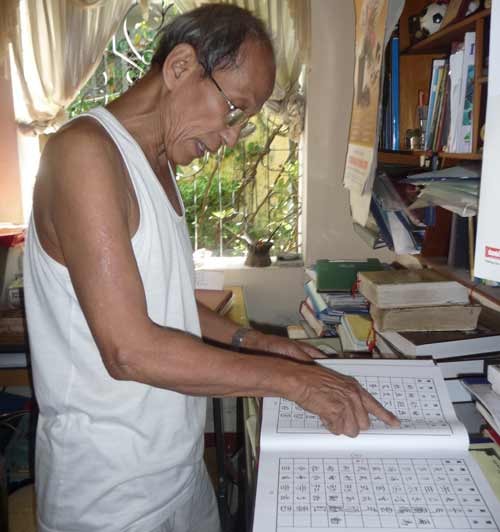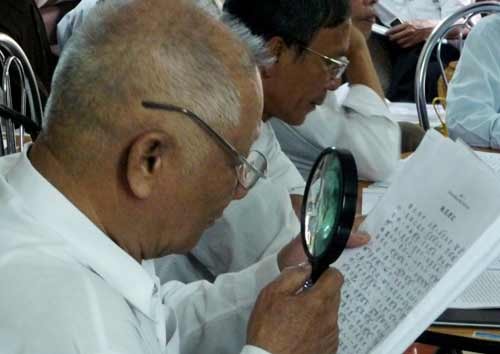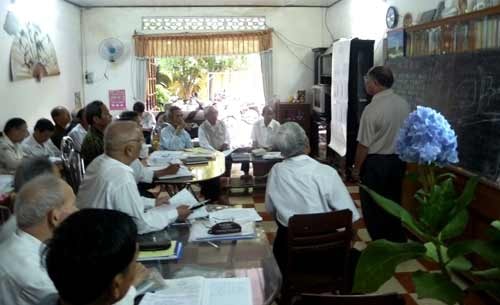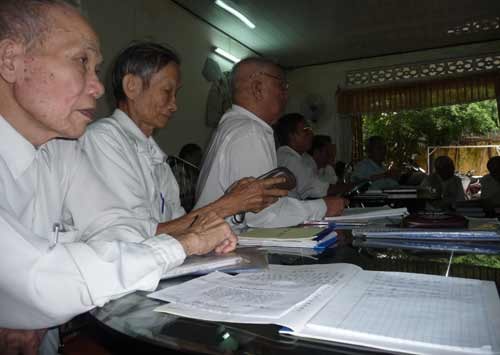90 elderly people self-study Han Nom to find sovereignty over Hoang Sa
90 elderly people self-taught Chinese characters and together translated and researched ancient documents on Vietnam's sovereignty.
The house of Mr. Ba - full name Huynh Phuong Ba (82 years old) is in a tiny alley in Hoa Thuan ward (Hai Chau district, Da Nang city). The house has become a "special" classroom, because it is only for the elderly to teach each other Han - Nom characters.

Mr. Ba's class organizes study sessions twice a month for seniors who are passionate about Han-Nom characters.
Silver-haired student
The class has always been a source of curiosity for the people around. Because on the 1st and 15th of every month, 90 white-haired “elders” (60-90 years old) gather to study. Studying all their lives like that still doesn’t satisfy them. They are passionate about learning Chinese and Nom characters to ponder over their old age.
The class was opened in 1995 and now many seniors have mastered Chinese-Nom characters and can study ancient Chinese characters. At first, the class was only for Mr. Ba's friends. Then the class was disbanded because the seniors could not handle it. Mr. Ba did not give up and continued to open the class, recruiting students until 2009, when the class had over 30 seniors studying.

Although their eyes are weak, if they see letters that are too small or blurry, the elderly use magnifying glasses to read and study.
Between classes, the elders sat together, chatting about life, drinking tea and enjoying music. Elders from Thanh Khe, Cam Le, Hai Chau, Son Tra districts heard the news and came to Mr. Ba's house to ask to study. There were all kinds of elders participating, from journalists, engineers, lawyers, teachers... and most of all, old veterans. Up to now, the class has up to 90 elders who both study and play, and it is also a place to learn to educate their children and grandchildren.

The elders were engrossed in listening to lectures on Chinese characters and helping each other learn.
“Most of them are still lucid, their health is sometimes good, sometimes bad, but they still study and research diligently. But some of them have to drop out of school because of their health and illness,” Mr. Ba confided.
Walk to class
Some of the old people who came to Mr. Ba's class rode bicycles, some walked, and some were stronger and rode motorbikes. All kinds of vehicles filled the yard. Some of the old people who couldn't walk even asked their children to take them there and pick them up at noon.
“My children and grandchildren are very happy to see that I am eager to learn, happy and have friends to play with. Studying in my old age is also to set an example for my grandchildren. I feel so sorry if my children cannot take me to a day. Thinking about studying for one day means losing a lot of knowledge. Sad, so sorry,” Mr. Pho Duc Vuong confided.
The student in the class who lives the farthest is Mr. Nguyen Van Hien (Duy Son commune, Duy Xuyen, Quang Nam).
Mr. Hien said: “I was helpless with Chinese characters so I was determined to learn them. I went to several places to study but found it was not good, so I went to Da Nang to study with the elders. Now I have learned quite a bit of knowledge and can read a few couplets. I understand the meaning of some ancient sentences.”
Mr. Ba said: "There are people who can't memorize a character even after writing it a hundred times. To learn Chinese characters, one must have health, time, passion, not worry about material life, and must have intelligence."
Contribute to sovereignty
Currently, they have the task of translating for cultural units and Da Nang City the archaeological documents from Han-Nom into Vietnamese. Not willing to stand still in the face of current events, they "rushed" into translating and introducing ancient documents of the Nguyen Dynasty related to Vietnam's sovereignty.
“We have examined and translated the 1838 map “Dai Nam Thong Nhat Toan Do” which has notes and drawings of Vietnam’s sovereignty over Hoang Sa. This can be considered a small act of old age in response to the concern about sovereignty,” said Mr. Ngật (84 years old).

Mr. Ba and others translated and researched ancient Chinese documents to learn and affirm that Hoang Sa's sovereignty belongs to Vietnam..
In addition, they also participated in translating and publishing the books: "Hoang Sa Island" excerpted from Phu Bien Tap Luc; Ministry of Public Works under Minh Mang year 17 (1836) reported on moving wooden pillars to mark Hoang Sa; Ministry of Public Works under Thieu Tri year 7 (1847) reported on postponing the survey of Hoang Sa.
As for Mr. Ba, who was fluent in French and Han-Nom, he translated and reviewed the book “The Awakening of Indochina Economy”. The book has a lot of information about the French publication of documents showing Vietnam's sovereignty.
According to Tintuc-M


